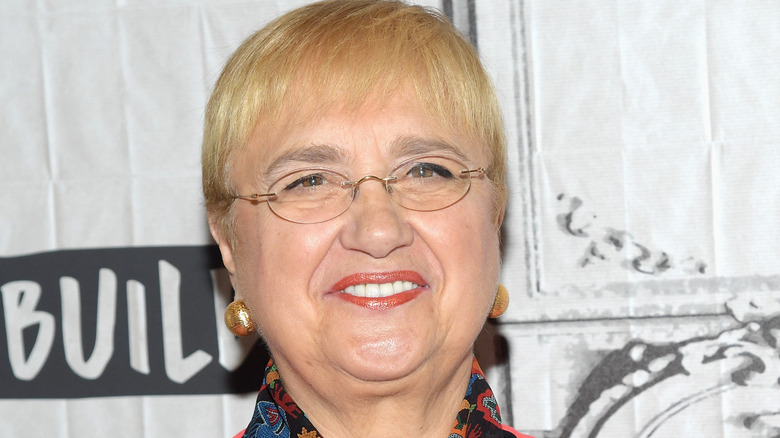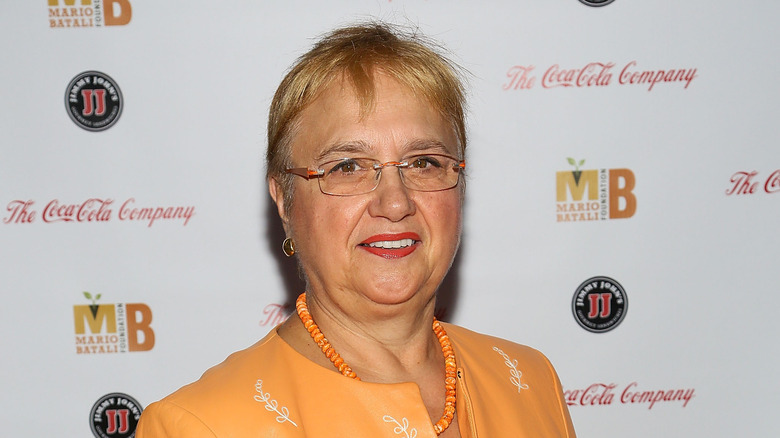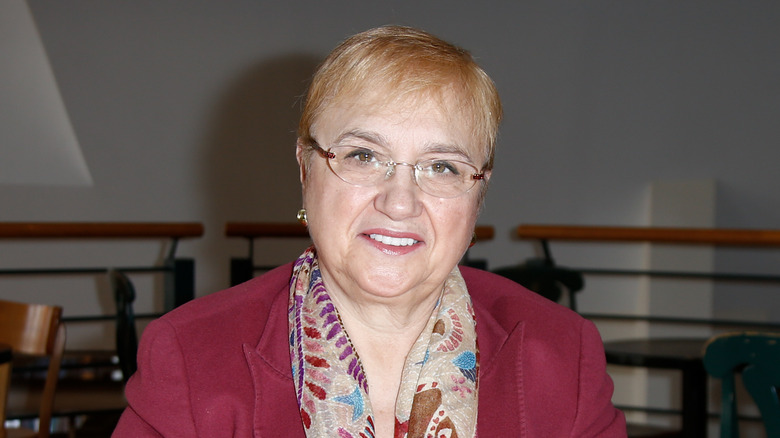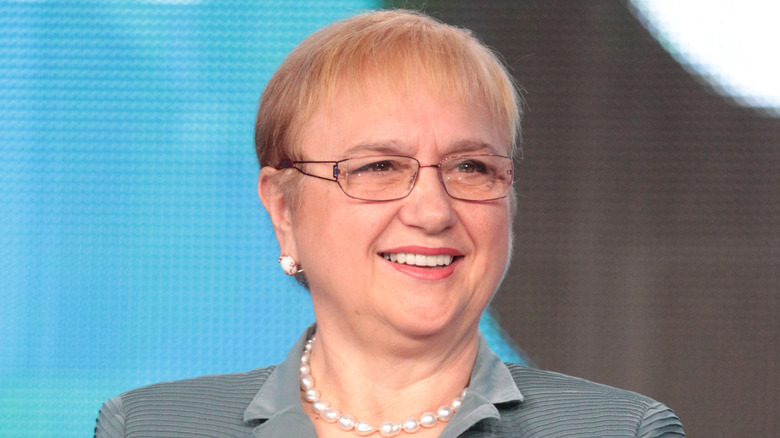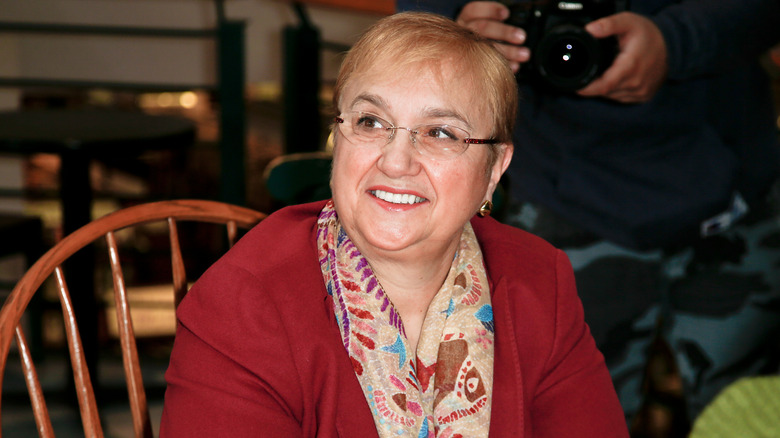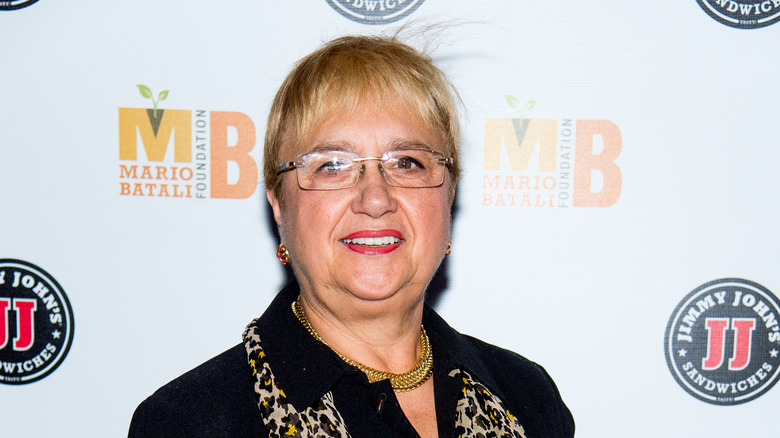What You Don't Know About Lidia Bastianich
If you love cooking shows, then you have definitely watched an episode or two of one of Lidia Bastianich's masterpieces. As a longtime host of Lidia's Family Table, the Italian chef offers public television viewers a more toned down and elegant televised cooking experience, in comparison to cooking shows on other networks.
Bastianich's life story is fascinating — she spent the first years of her life on the peninsula of Istria in an area known as Pula, but became a refugee in Italy at just 8 years old. Her family immigrated to the United States in 1958 with the assistance of Catholic Relief Services, and when they arrived in New York, she couldn't speak English (via NPR). At the age of 18, Lidia got engaged to Felice Bastianich and the pair opened a restaurant in Queen, News York. From there, they established new restaurants and sold successful ones, building a following along the way.
Lidia Bastianich has written more than 13 cookbooks, a memoir, and is the host of her beloved cooking show. It definitely seems like she's showing no signs of slowing down.
Lidia Bastianich's farming background taught her about cooking
Lidia Bastianich's time in Pula taught her a good deal about cooking. Her grandparents lived in a farming village, and she learned a lot about their trade. She accompanied them to animal fairs, helped raise livestock on their farm, and watched as their animals were then killed for food purposes. She told NPR's Terry Gross that raising animals for the sole purpose of consumption was an interesting challenge, but one that she came to appreciate.
"I loved the bunny rabbits. The small rabbits, when they came, we played, and we cuddled them and whatever. And, you know, two weeks later, they were part of the dinner table," she said, calling the experience the "cycle of life."
"You help to raise these little animals, and they become adult animals or — and they become food," she said. "When food is scarce, every morsel is really appreciated. In a sense, you know, you are grateful to these animals."
Lidia Bastianich's life changed drastically when Communists took over her country
After World War II, the people living on the peninsula of Istria quickly realized everything they were used to was changing. The land fell under Yugoslavian control, and a Communist regime took over. Lidia Bastianich and her family had to adjust — they were now required to speak Croatian instead of Italian, and secret police began monitoring their movements. Bastianich explained to NPR that she and her family began living dual lives as a result.
"There was two parts of my existence and that was the security part in the house, whispering in Italian, sometimes talking about religion, and then the oppressive side growing under communism and having to follow the Communist dogma," she said.
In addition to being stripped of their religion, Bastianich revealed that their names were changed and their farms were taken out of their control (via NPR). Her father, who owned a business, was named a capitalist and was punished as a result. "He was put in prison for about 40 days," Bastianich said.
Lidia Bastianich was discovered by cooking legend Julia Child
A lot of famous people can pinpoint the moment at which they were discovered, and Lidia Bastianich is no different. For her, the big moment in her career came when famed fellow cook and author Julia Child asked Bastianich to appear on two episodes of her show, Lessons with Master Chefs. Bastianich told Food & Wine that the appearance went wonderfully, and she received a "very tremendous response" as a result.
"One of the shows was nominated for an Emmy, which had to do mostly with Julia, but I remember specifically that we made mushroom risotto, and the technique and everything — it just fit, I think. There was a harmony to what we were doing," she said. The producer then asked her an incredible question: had she ever thought about having her own show? At that point in time, the idea of a show hadn't crossed Bastianich's mind. But clearly she was moved towards a life in cooking shows.
Lidia Bastianich has filmed over 100 cooking episodes
Since her whirlwind experience with Julia Child, Lidia Bastianich has had an impressive television career. She's filmed over 100 episodes across three television shows: Lidia's Italian Table, Lidia's Italian-American Kitchen, and Lidia's Family Table. Bastianich told Food & Wine that her favorite recipes to share are the ones that are easiest to make.
"I think simple is the hardest to achieve, because you don't have all those elements to hide behind," she said. "Therefore, I present simple pasta, chicken or fish dishes and demystify them."
Filming in her home has caused a few issues over the years, but luckily Bastianich has a pretty good sense of humor about it. She explained that all the elements of production are set up in her house, so technical issues can arise.
"A whole setup just fell on my arm while I was cooking," she revealed. "The whole thing was unexpected!"
Lidia Bastianich's job helps her share cooking with the world
In addition to her television shows, Lidia Bastianich also co-writes cookbooks with her daughter, Tanya Bastianich Manuali, and teaches cooking classes at Eataly, an Italian eatery and market with multiple locations. For Bastianich, it's all part of connecting with other people.
"It's a great reward to be a door-opener for people who otherwise might not cook. I am passionate about what I do," Bastianich told PBS affiliate WTTW. "I think cooking is a gift that was given to me, and I feel that in the end, it's not mine to keep, but to share."
Bastianich also shared that cooking and eating food is, for her, is a way to stay grounded.
"Food roots you. It gives you stability," she said. "You know that Christmas comes at your house and the Sunday sauce with the sausage and the meatballs is a must. You eat that throughout your life. Then every time Christmas comes and you see that on the table, it makes you feel good. It makes you feel you belong."
